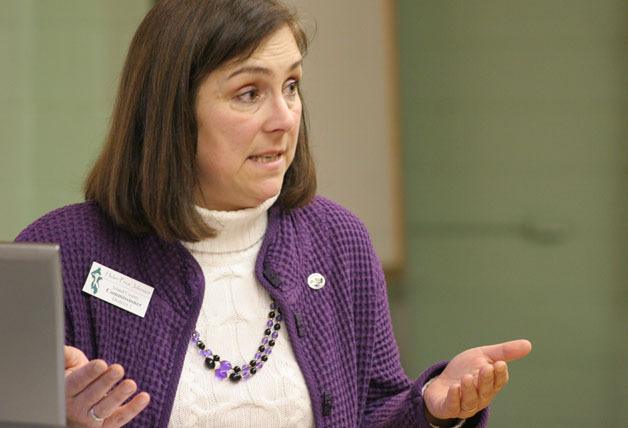CLINTON – Only a bit of Island County is underwater, and not where you’d think.
Island County Commissioner Helen Price Johnson gave a “state of the county” address at the Clinton Community Hall on Wednesday, and offered an upbeat assessment of county government chugging along under the strain of repeated budget cuts.
The talk was wide-ranging, from flooding to ferries.
Price Johnson began by noting the failure of Proposition 1 at the ballot box last year, a measure that would have prevented more layoffs of county workers and additional cuts to government services.
The commissioner briefly highlighted cuts in services, which include six fewer sheriff’s deputies, the elimination of funding for 4-H and Master Gardener programs, and a 50-percent reduction in money for Senior Services.
There were bright spots, however.
Price Johnson said 4-H clubs had raised enough money to pay for a coordinator for the 4-H program for six months, which would mean 4-H’ers could still compete at the county fair.
“That’s really good news,” she said, adding that Island County is the only county in the state that won’t fund a 4-H program this year.
Staffing levels for the county have dropped below the 1998 level, and Price Johnson urged residents to be patient with a county staff that has been stretched thin.
That said, customer service was still “a very high priority,” Price Johnson said.
Citizen access to the workings of county government was being improved, she said, noting that residents could listen to commissioner meetings online, and that work-session agendas were also being posted on the county website.
A permit tracking system has also been purchased, which will help contractors and residents stay updated on pending applications without playing phone tag with county employees.
There was other good news, as well.
“Our economy is stabilizing. Our tourism dollars and our agricultural community are generating income and growing,” Price Johnson said.
Also doing well, she added, are the manufacturing and service industries.
“The only segment of our economy that’s still in the red is our construction industry, which is no surprise to anybody,” Price Johnson said.
Price Johnson praised the county’s tourism program for bringing additional business to Whidbey and Camano islands, and said one area of focus would be culinary tourism and restaurants that feature homegrown farm products.
“That’s been a very good investment for us,” she said of the cooperative effort underway by local jurisdictions.
Another big draw: the islands’ state parks. Price Johnson said that state parks in Island County attracted 3.6 million visitors in the past year.
“That’s a good indicator of just how many visitors we have coming,” Price Johnson said.
Though officials in Olympia have been pondering park closures in light of the state budget deficit, Price Johnson said locals need not worry.
“There are going to be a few state parks I think that might get closed, but not the ones on Whidbey,” she said.
Speaking of the state’s money problems, Price Johnson noted the ongoing funding dilmena for the state ferry system, and the unpopular idea to create a new taxing district to pay for ferries.
The idea, proposed earlier this year by Gov. Chris Gregoire, was not getting any support in the Legislature, Price Johnson said.
“It certainly didn’t get any support from me,” she added.
The commissioner also said that state Sen. Mary Margaret Haugen has promised that the Coupeville (Keystone)-Port Townsend ferry run will continue to have a second ferry assigned to the route, but perhaps a shorter season.
Price Johnson gave an overview of the recent flooding problems near Frog Water Road, and the county’s work to protect repairs downstream made after the 2009 Glendale flood.
She also detailed the county’s new clean water utility, which will help pay for efforts to handle stormwater runoff and protect water quality.
The effort will be pahsed in over two years, she said, and property owners should expect to see a $25 assessment to pay for the utility later this year.
“Clean water is too important to leave to the ups and downs of Wall Street,” she said.
“Without it, none of our property would be worth a dime,” Price Johnson said.



